7+ SAMPLE Department Budget
-
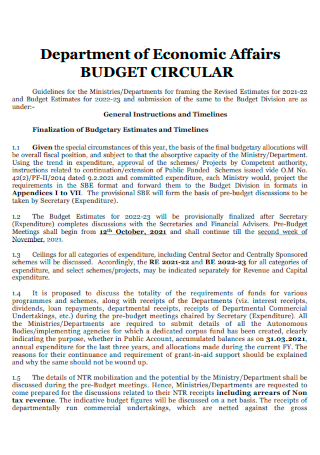
Department of Economic Affairs Budget Circular
download now -
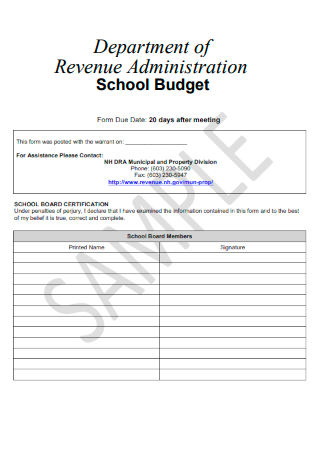
Department of Revenue Administration School Budget
download now -
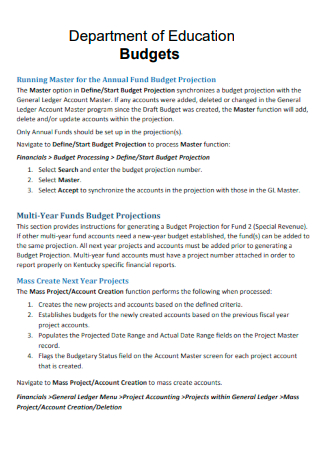
Department of Education Budgets
download now -
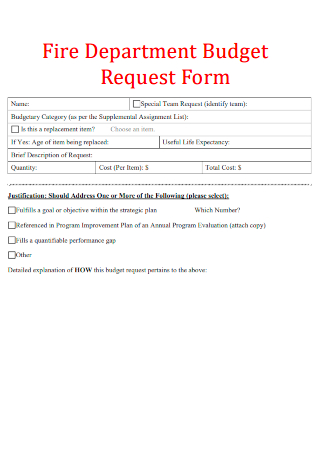
Fire Department Budget Request Form
download now -
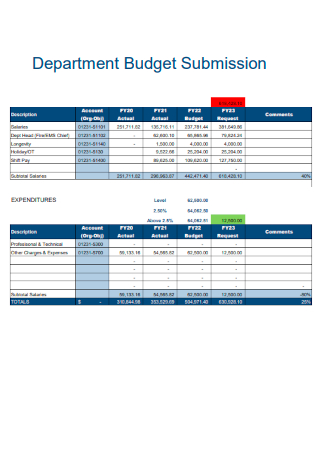
Department Budget Submission
download now -
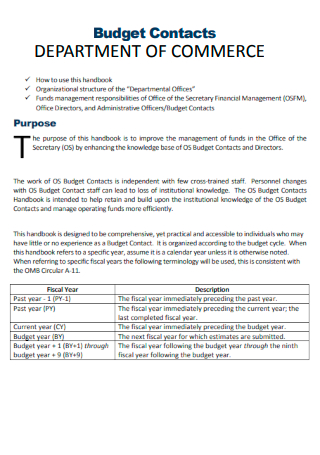
Department of Commerce Budget
download now -
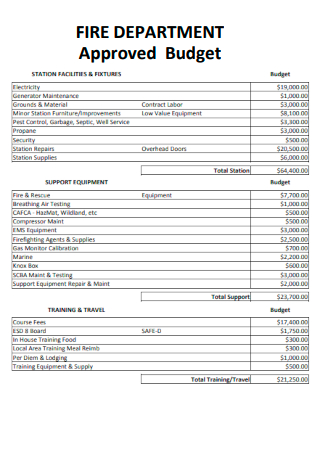
Fire Department Approved Budget
download now -
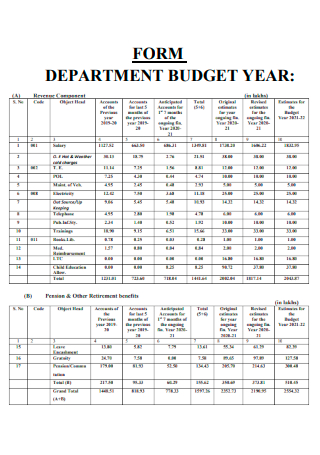
Department Budget Year Form
download now
FREE Department Budget s to Download
7+ SAMPLE Department Budget
a Department Budget?
Benefits of Departmental Budget
Tips for Business Budget Management
How To Prepare a Department Budget
FAQs
Why is a budget so essential?
What is budget formula?
What are the components of a company’s budget?
Why do so many small businesses lack a budget?
What Is a Department Budget?
The phrase has the same meaning as it sounds. A departmental budget is a financial plan at the department level that outlines spending for the next quarter or fiscal year. Managing a departmental budget is comparable to managing a home budget, albeit with additional stakeholders and moving elements. In light of this, departmental budget planners must begin with a reasonable basis. This requires setting objectives about income and spending, overhead, predicted sales, and anticipated material costs. In addition, you should include a buffer in case things do not go as planned. 61% of small enterprises have no defined budget, according to statistics.
Benefits of Departmental Budget
Just as a personal budget can help assure sufficient retirement savings, a corporate budget can help secure the company’s long-term success. Budgets also help startups get started off to a good start. Predicting income and expenses for the upcoming month, quarter, and year(s) will assist your organization in remaining lean, efficient, and open for business, even in the absence of past expense data.
Tips for Business Budget Management
Two distinct concepts are understanding why a budget is essential and implementing good corporate budget management amid daily operations. Let’s examine a few options for translating high-level comprehension into actionable activities for you and your management team.
1. Set budget details appropriately
Budgets can take various shapes. The first step in creating adequate funding is determining how thorough this particular version should be. Most likely, you will wish to divide budgets at least by department. It is often not beneficial to go too deeply into line items. Managers or even individual staff may be better qualified to understand the specifics of frequent transactions. You also want budget flexibility for managers based on performance. For instance, a marketing manager may require the ability to transfer spending between social media sites. In recent years, marketing expenses have remained relatively stable, accounting for an average of 11.2% of a company’s revenue, according to statistical data. Statistics show that 33% of Americans have a documented financial plan. Nearly half of the remaining respondents indicated they lacked sufficient funds to make a strategy feasible. Others claimed it was too difficult or they lacked time to establish a plan.
2. Delegate Effectively
In the initial phases of establishing a business, proprietors may cover most expenses out of pocket. As organizations expand, one defining moment is when the volume of decisions exceeds the owner’s ability to handle them alone. Entrusting someone else with financial decisions is a bold move! Initially, it is not easy to delegate the authority to spend the company’s funds. Delegating will alleviate the bottleneck caused by the owners’ approval of every purchase choice. Departments can respond more nimbly to their demands. The availability of budget management training tools can assist managers in enhancing their abilities.
3. Get together
Departments require a certain degree of autonomy over their budgets. Equally essential is the promotion of communication between linked departments—the objectives of the marketing team and the sales team overlap. Thus, collaborating can help each team perform more efficiently. Finance may benefit from collaborating closely with IT to identify the most cost-effective solutions for keeping systems current. Human resources may need to consult with the travel management team to establish ways for cost-effective recruitment.
4. Regulate Budget Reporting
If you’ve followed the procedures in order, you should now have a budget that spans many departments. Each department individually manages its budget and works with other teams. It is crucial to have a central “home” for budget management so that executives can obtain a comprehensive, high-level perspective when necessary. This can be accomplished by utilizing a centralized system that all budget users can access. Thus, you will not be confused about how to integrate all records into a single master budget record.
5. Collect accurate numbers
Monitoring actual business spending is the budget’s lifeblood. Without this stage, a budget is merely a theoretical document with no natural ability to influence business decision-making. Collect complete and precise updates during each period to determine how your budget operates. This can be accomplished by establishing distinct cost categories and making expense submission as straightforward as feasible. Regarding types, context is crucial. Depending on the objective of the outing, the same restaurant meal might be classified in various ways. Configure your system to categorize these charges to view each expense type accurately. When submitting an expenditure report takes only a few minutes, you are more likely to provide complete information. Choosing a budget management program with capabilities such as receipt snapshot capture and automated classification might facilitate the process.
6. Select small accounting software
The more time managers spend pursuing employees for expenditure reports, the more likely it is that spending will fall through the cracks. The accounting software you choose can significantly impact how easy it is to capture and distribute budget data. Cloud-based technology is ideal for connecting multiple departments or locations. It’s simpler to invite someone from another department to come over and look at a cost that affects numerous teams. Everyone sees the most recent information, so you don’t get mixed up between revisions of the same document. Modern technological solutions frequently feature automated processes that can lessen the likelihood of errors. Spreadsheet data entry is particularly sensitive to human error. Automation can save staff time while also producing more accurate reports.
7. Set budget updates
We’ve all been in circumstances where every project appears to be due simultaneously. During a time of stress, it can be tempting to abandon any duty that isn’t directly related to dealing with a heavy workload. However, budget management must be prioritized if you want to keep your company’s finances on track. It’s all too tempting to put off reviewing something until next week, “when things calm down.” The longer you put off budgeting, the more likely you will soon have a new fire. Determine how frequently you will close books and notify department heads of any required course adjustments. A quarterly or monthly check might help detect overspending and address it.
How To Prepare a Department Budget
An organization’s budget governs how it uses capital to achieve its objectives. For this reason, the ability to develop a budget is one of the most important abilities for any company leader, whether they are an entrepreneur, executive, functional leader, manager, or striving to be one. Follow the procedures below when generating a project, initiative, department, or organization budget.
1. Know what your organization wants to achieve.
Before creating a budget, it is essential to have a firm grasp of the objectives your organization will pursue over the budget period. By knowing these objectives, you can create a budget that supports and aligns with them. Consider, for instance, a company whose consistently rising expenses offset a year-over-year revenue increase. This firm may benefit from a greater emphasis on spending management during the budgeting process. Consider an organization that is introducing a new product or service. The company may invest more substantially in the developing business line to foster its growth. To achieve this objective, the corporation may need to reduce expenses or growth plans in other areas of its budget.
2. Estimate Your Income Throughout the Budget Period
To allot funds for business expenses, you must first know your income and cash flow for the period to the best of your knowledge. Depending on the nature of your firm, this procedure may be easy or complex. For instance, a business that sells items or services to established clients bound by contracts will have an easier time forecasting income than one that relies on active sales activity. In the second scenario, it would be crucial to consult previous sales and marketing data to determine whether the industry has changed in a way that could cause you to miss or exceed prior trends. You should also include additional income streams, such as returns on investments, asset sales, bond or stock issues, and sales revenue.
3. Identify Your Expense
After determining your anticipated income for the period, you must estimate your expenses. This procedure entails three primary categories: fixed expenditures, variable expenses, and one-time expenses. Costs that remain consistent throughout time and do not fluctuate significantly from week to week or month to month are fixed prices. A contract sets these costs in many instances, making them straightforward to forecast and account for. This category often consists of expenses associated with overhead, such as rent and utilities. In addition to debt payments, phone, data, and software subscriptions might also fall under this category. Include any recurring and anticipated expenditures. Variable expenses are those your firm incurs that vary over time based on several factors, including sales activity. Finally, one-time expenses, sometimes known as “one-time spends,” do not reoccur and occur less frequently. The purchase of equipment or facilities, developing a new product or service, hiring a consultant, and resolving a security breach are one-time expenses. Understanding important initiatives and what it will take to complete them, and what you spent on similar things in prior years can help you account for them in your budget, even if you do not know their exact costs.
4. Determine the surplus or deficit of your budget.
You may include them in your budget after accounting for your revenue and expenses. Here, you decide whether your predicted income is sufficient to meet all of your costs. If your income is higher than your expenditures, you have a budget surplus. Having this knowledge, you should evaluate how to utilize additional funds best. You may, for instance, transfer the funds to an emergency fund that you can access if your actual income falls short of estimates. You might also use the funds to expand your firm. Also, a budget deficit exists when expenses surpass income. You must now determine the optimal course of action to close the gap. Can you increase revenue by selling more aggressively? Can you reduce your variable or fixed expenses? Would you consider selling bonds or shares of company stock to inject additional funds into the business?
FAQs
Why is a budget so essential?
A budget assists in achieving financial stability. A budget makes it easier to settle bills on time, develop an emergency fund, and save for significant investments such as a car or home by tracking costs and according to a plan. Overall, a budget strengthens a person’s financial position for both the short and long term.
What is budget formula?
Income: Expenditure = Profit is the primary budget equation. When determining an initial amount for your budget, there are three key areas to examine: your business’s sales income, including all conceivable income streams, total business spending for the budgeted time, and your expected profits.
What are the components of a company’s budget?
A budget should include your revenues, costs, and—most significantly—your profits or cash flow to determine whether you have money left over for capital projects or expenditures. A budget should be established at least once per year.
Why do so many small businesses lack a budget?
Although budgets may appear omnipresent, not all businesses consider them essential. In 2020, fifty percent of small enterprises functioned without a formal budget. According to experts, companies may eschew standard budgets because they are superfluous or fail to anticipate variations in corporate earnings.
In the end, departmental budgets give brands a chance to get more specific about handling their money. By putting all budgeting information in one place in the cloud, teams from all over the organization can help their department reach its financial goals.
